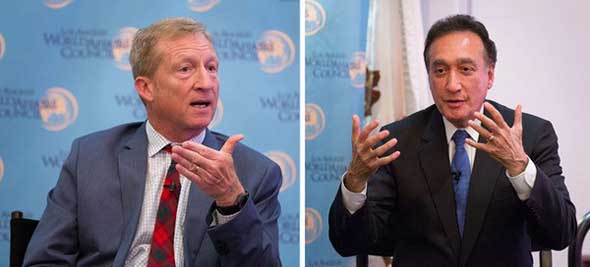 Tom Steyer, hedge fund manager and environmentalist (left) and Henry Cisneros, former US Secretary of Housing and UrbanDevelopment (right), speaking at the Council
Tom Steyer, hedge fund manager and environmentalist (left) and Henry Cisneros, former US Secretary of Housing and UrbanDevelopment (right), speaking at the CouncilClimate change is a politically controversial issue in the US, but whatever one believes about the causes, the effects are already manifesting themselves, and California is facing some major challenges to its agriculture industry and its coastline property owners, according to Tom Steyer, the billionaire environmental activist, and Henry Cisneros, the former mayor of San Antonio in Texas and Housing Secretary under President Clinton.
85% of Californians live along the coast, where sea levels are predicted to rise between 1.5 ft and 3.5 ft by 2100, which could lead to tens of billions of dollars in property losses, according to a report by Risky Business, a non-partisan group sponsored by Steyer and Cisneros as well as former Treasury Secretary Henry Paulson and ex- New York City mayor Michael Bloomberg. California also produces two thirds of the nation’s fruit, one third of its vegetables and one fifth of all the dairy – all of which are extremely sensitive to a change in climate.
Steyer quoted a meta-survey of published literature on climate change, which found that “97% of scientists believe this is happening, and it is caused by human activity – we are not seeing any real scientific pushback on this.”
But despite the scientific literature, Steyer and Cisneros conceded that large portions of the US public are still skeptical about climate change. “People go through winters like this one, with record snow in Massachusetts, and they say this can’t be climate change,” said Cisneros. But the real issue, said Steyer, was not whether Americans agree that climate change is happening – but “where do they put it in rank order of the issues we face?” While he himself puts it at the top, the US public has not done that yet. “This is not the top priority of people in the US, and it should be. But people do not respond to generic global problems – they respond to local human issues and how they affect their communities and their families.” And so far, apparently, that case has not been persuasively made to the American public.
Although there is no direct link between the decades-long warming trend associated with global climate change and the current four year drought in California, Cisneros pointed out that the higher overall temperatures meant that when California does get precipitation in the winter, less of it falls as snow which can be captured and channeled for public use when the snow melts, and more of it falls as rain, which runs off more quickly. As for the reasons for the drought, Steyer pointed to the Stanford-named “Ridiculously Resilient Ridge” of high pressure that has been stubbornly parked off the west coast for months and has been pushing precipitation northwards away from California.
Even if California’s drought is not directly caused by the rise in greenhouse gas emissions, the fact that the state is now facing mandatory water restrictions has brought the larger debate over climate change to the fore. Cisneros predicted that big business would be in the vanguard of those looking for ways to deal with rising temperatures, because it will affect how they do business. “In the US we structure everything around a calculation of pricing, which helps determine what we should do – and it is impossible to separate environmental change from business costs.”
Steyer also said that China – which has overtaken the US as the main producer of greenhouse gas emissions worldwide - must be part of a global solution, and noted that the US and China signed an agreement to work to limit greenhouse gas emissions at the end of last year. “The Chinese and the US must lead on this… this is going to be the challenge of our generation.”
